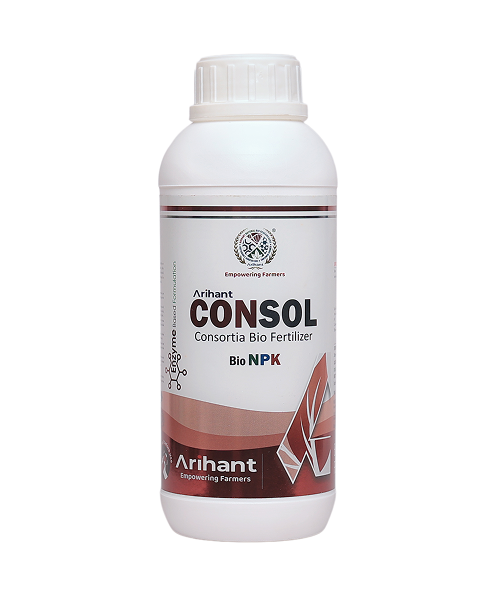- HOME
- Corporate Site
- Sell on BigHaat
- Bulk Order Inquiries
-
BRANDS
MAHYCO SEMINIS NAMDHARI UPL RIJK ZWAAN SYNGENTA US AGRI KNOWN-YOU NUNHEMS (BAYERS) I & B SEEDS TAKII INDO AMERICAN DUPONT PIONEER MONSANTO DEKALB TANINDOEAST WEST NUZIVEEDU BIOSEED RASI FITO H M CLAUSE URJA ASHOKA PAHUJA VNR SAKATA PHS SUNGRO UNIVEG TOKITA PAN SEEDSDOW AGRO SCIENCE UPL TATA RALLIS DHANUKA ADAMA BAYER PCI BARRIX INDOFIL HYDERABAD CHEMICAL PI INDUSTRIES RINUJA
- SEEDS
- CROP PROTECTION
- CROP NUTRITION
-
MACHINERY
- ANIMAL HUSBANDARY
- SEGMENTS
- BigHaat Services
- KNOWLEDGE
Your cart is currently empty.
Top searched
- Description
About Product
- Consortia is a combination of more than one microorganism that, being in the rhizosphere, directly or indirectly influences the composition and productivity of natural plant communities. Consortia, also known as Bio NPK (Nitrogen, Phosphorus, and Potassium), are a combination of multiple beneficial microorganisms that work together to provide a comprehensive nutrient management solution for plants.
- These consortia consist of different strains of bacteria, fungi, and other beneficial microbes.
Technical Content
- CONSORTIA ( BIO NPK ) Viable cell count : CFU minimum in a mixer of any 2 or maximum three of the following microorganisms , Azotobacter 5 x 10 ^ 7 per ml, Rhizobium 5 x 10 ^ 7 per ml, Azospirillum 5 x 10 ^ 7 per ml,
- Total Viable Count CFU minimum 1.5 x 10 ^ 8 cells per ml.
Features
- Azotobacter , PSB (Phosphorus Solubilizing Bacteria) , KMB (Potassium Mobilizing Bacteria) , Supply of Essential Nutrients , Prevention of Micronutrient Deficiency , Chelation with EDTA "Benefits : Azotobacter: This microorganism has the ability to fix atmospheric nitrogen, reducing the dependency on synthetic fertilizers.
- It can fix nitrogen up to 20-40 kg per hectare, providing an important source of nitrogen for plant growth.
- PSB (Phosphorus Solubilizing Bacteria): PSB produces organic acids that assist in the uptake of phosphate, leading to increased maturity and enhanced yield. The production of organic acids such as malic, succinic, fumaric, citric tartaric acid, and acetic acid accelerates phosphate availability and uptake by plants.
- KMB (Potassium Mobilizing Bacteria): KMB enhances crop resistance against diseases and stress conditions. It also secretes growth hormones, which can increase crop productivity. By mobilizing insoluble potassium, KMB reduces the need for potash fertilizers by 50-60%.
- Supply of Essential Nutrients: The Bio NPK consortia ensures the supply of essential nutrients in optimal quantities to the crops. This balanced nutrient availability promotes healthy plant growth and development.
- Prevention of Micronutrient Deficiency: The consortia helps prevent micronutrient deficiencies that may occur at different growth stages of crops. By supplying a complete range of nutrients, it ensures that the crops have access to the necessary elements throughout their growth cycle.
- Chelation with EDTA: The presence of EDTA ( Ethylene Diamine Tetraacetic Acid) chelates in the consortia facilitates the fast absorption of all individual microelements by plants.
- This improves the efficiency of nutrient uptake, ensuring that plants receive the required microelements for optimal growth and development.
Dosage
- 1 LITRE PER ACRE.
Method Of Application
- SEED TREATMENT , ROOT DIPPING , FOLIAR SPRAY , SOIL APPLICATION , DRIP IRRIGATION.
Additional Information
- Each microorganism plays a unique role in fixing nitrogen, solubilizing phosphorus, and mobilizing potassium, thereby promoting the availability and uptake of these vital nutrients by plants.
- By utilizing Bio NPK consortia, farmers can optimize nutrient utilization, improve soil fertility, enhance crop growth and yield, and reduce their reliance on chemical fertilizers, thereby promoting sustainable and environmentally friendly agricultural practices.
- Bio NPK is a combination of Azotobacter, Phosphate Solubilizing Bacteria, and Potash Mobilizing Bacteria; combined they give a wholesome nutritional solution for the crop.
- Crop Suitability - Grapes & Banana, Citrus, Mango, Tomato, Pomegranate, Groundnut, Cotton, Soyabean, Coconut, Potato, Brinjal, Onion, Garlic, Cumin, Chillies, Beans, Okra, Pea, Tomato, Cabbage, Cauliflower, Sugarcane, Paddy, Rice, Wheat, Sorghum, Bajra, Lawns, Gardens, Green House.
Add To Cart




















